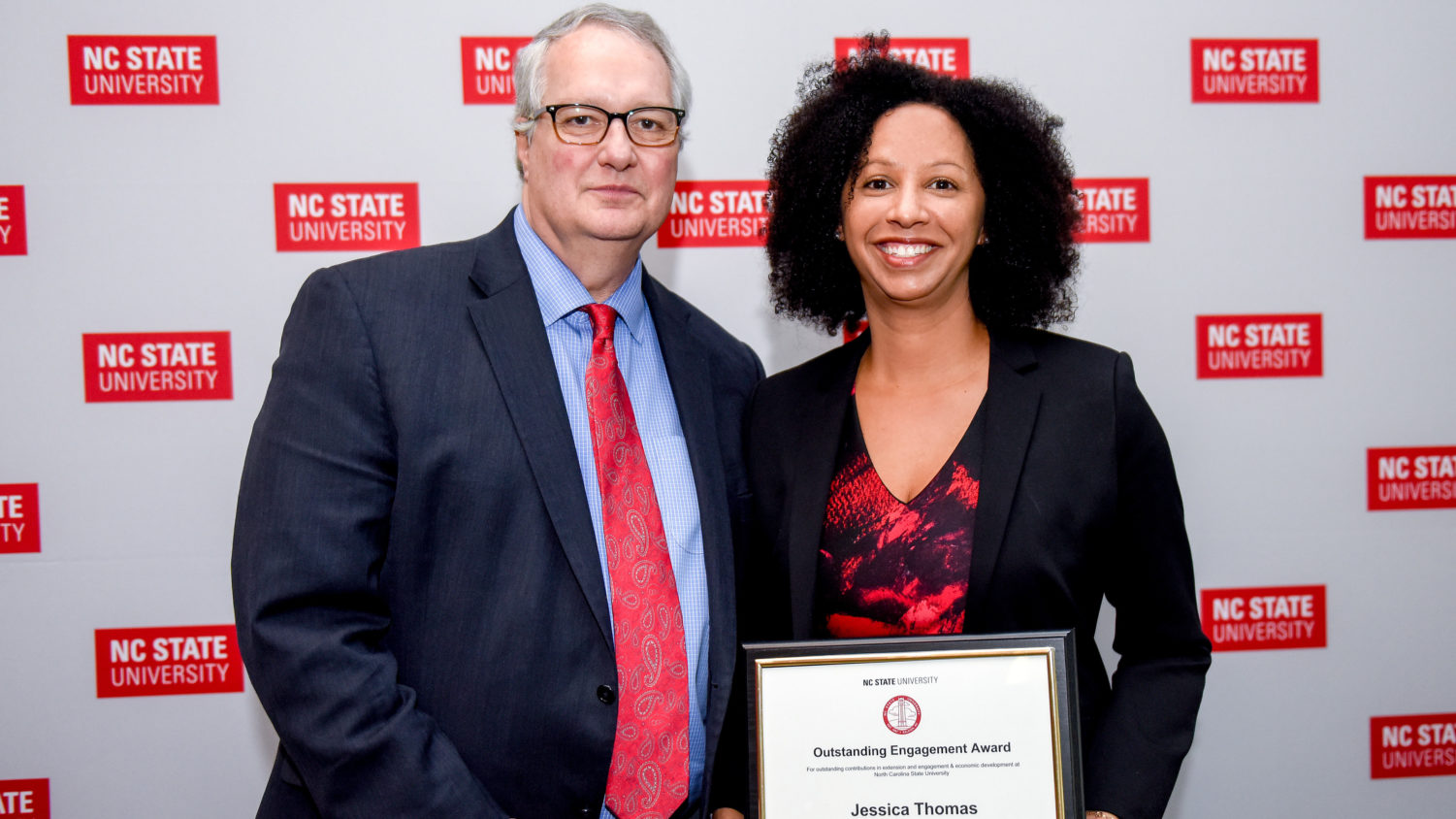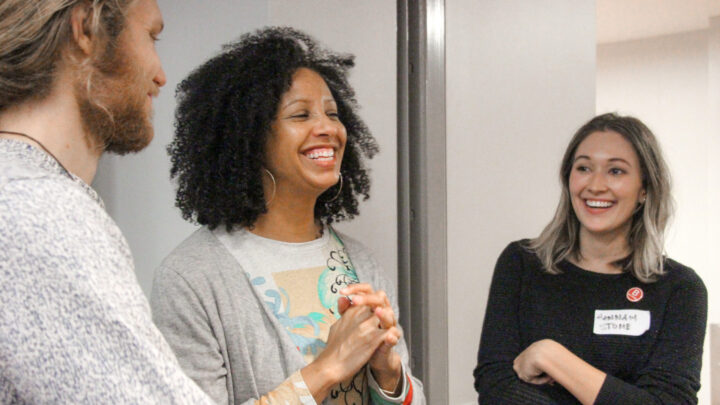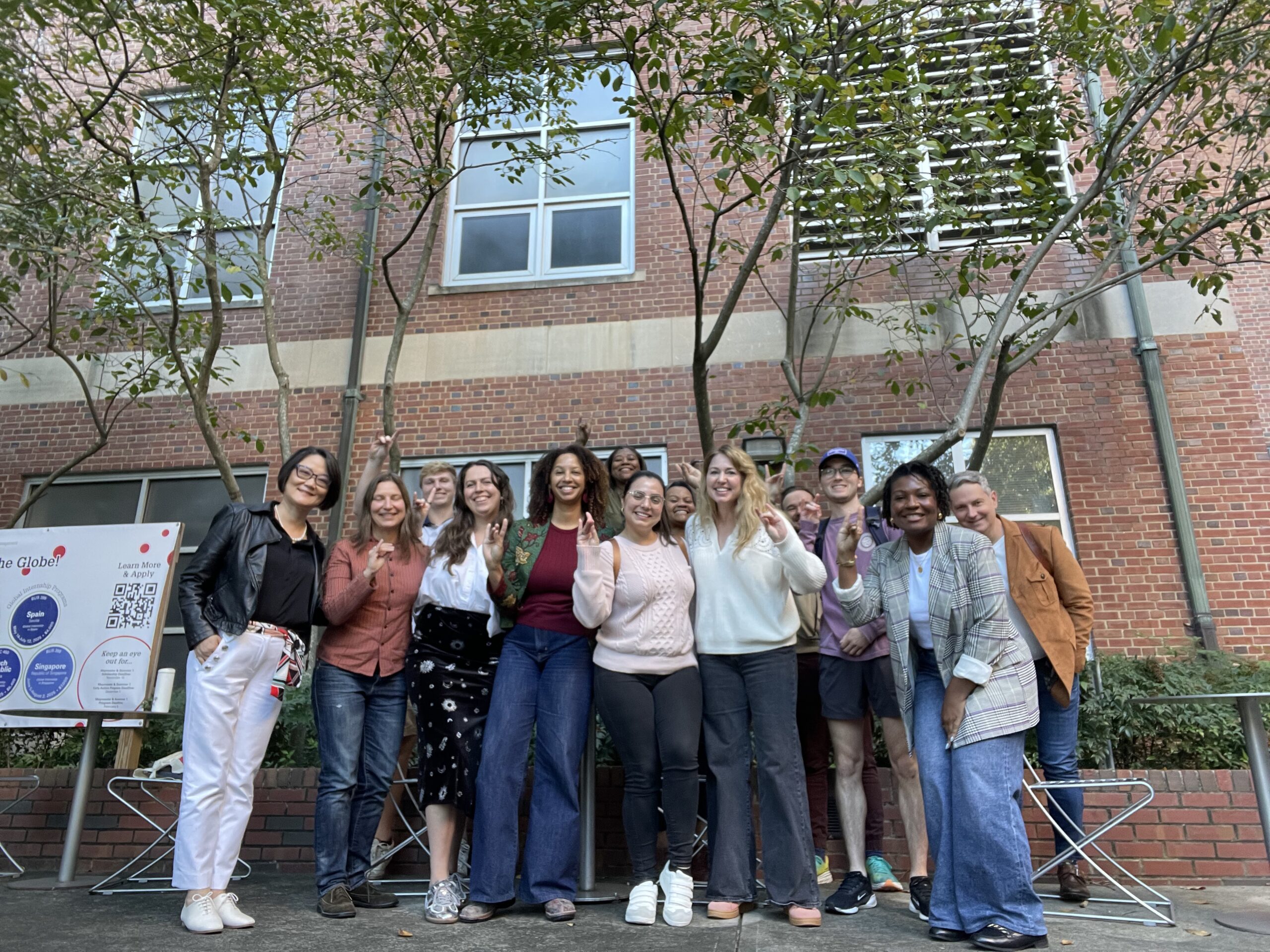BSC Director Recognized for Outstanding Outreach and Engagement

Jessica Thomas, director of the Business Sustainability Collaborative (BSC) at the NC State University Poole College of Management was recognized recently for her commitment to teaching, research and public service by NC State’s Office of Outreach and Engagement.
BSC Director along with ERM Director and Professor of Accounting Mark Beasley were among the 12 faculty and staff members honored at the 2019 Outstanding Extension and Outstanding Engagement Awards Celebration held on April 16. Beasley also was one of three university professors inducted into the Academy of Outstanding Faculty in Extension and Engagement this year.
These awards encourage and recognize outstanding extension, engagement, and economic development activities by faculty and EHRA employees of NC State University. They reflect the individual’s activities and achievements in the previous five years, and are directly parallel in intent to the University’s Outstanding Teaching Awards.
Both Beasley and Thomas have created initiatives that reflect the university’s land-grant mission. Through ERM and the BSC, they assess needs, develop appropriate programs to address those needs, and often work outside the traditional classroom to provide education and assistance that helps individuals in business and industry to make decisions and solve problems, engaging students and other faculty members in the process.
Thomas joined Poole College in 2014 to establish what is now the Business Sustainability Collaborative. The vision of BSC since its beginning has been to solve businesses’ greatest social, environmental and economic challenges. BSC connects students, faculty, and the business community through experiential learning, career development, academic and applied research, and partnership opportunities.
“As founding director of BSC, I have worked to assess the needs of our NC State community as well as the local and global business community to develop programs inside and outside the classroom focused on using business as a force for good,” she said.
The Collaborative works with faculty to integrate environmental, social and financial responsibility into curricula throughout Poole College. It also engages industry to advance and share innovative sustainability practices that lead to positive business results, and engages students from area universities in its programs.
Most recently, Thomas’s work with the BSC has focused on B Corporations – businesses that meet the highest standards of verified social and environmental performance, public transparency, and legal accountability to balance profit and purpose. “B Corps like Patagonia and Ben & Jerry’s – and close to 3000 other companies around the world – form a community of leaders and drive a global movement of people using business as a force for good,” Thomas said.
NC State is now recognized as one of the academic leaders in studying and teaching about B Corps, she said. Thomas recently collaborated with the authors of The B Corp Handbook to develop an Instructor’s Guide – a roadmap for faculty to use the B Corp Handbook in the classroom. The second edition of The B Corp Handbook and the Instructor’s Guide will be published on April 23.
Students engaged with BSC gain hands-on consulting experience and the chance to learn about social and environmental impact assessment and sustainable business models. They have come from across NC State and participating academic institutions, including Duke University, University of North Carolina at Chapel Hill, Elon University, Wake Tech Community College, NC Central University, North Carolina A&T University, and Appalachian State University. Over the last two semesters, 83% of the team leads for the B Corp Clinic project teams were women.
BSC’s B Corp Clinic, launched in 2014, connects students with local and global for profit businesses to help them improve their environmental and social impact. Companies are matched with a team of students from multiple schools and disciplines to go through an assessment process and identify strategies they can take to improve the company’s impact. The B Corp Clinic thus far has worked on 42 semester-long projects with companies that range from start-ups to multinationals, from a broad range of industries, local and as far away as California and Australia. “Students and companies can participate from anywhere in the world via an innovative virtual platform,” Thomas said.
The Clinic is currently being replicated at six academic institutions across the US and Canada, Thomas said.
“I’m excited to continue to grow the Global B Corp Academic Network (B Academics), which I helped to found in 2014,” Thomas said. “B Academics will soon be a network of over 1,500 educators and researchers from around the world who are committed to accelerating the sustainable business movement by studying the global movement of B Corporation certification and benefit corporations. They work with each other, the global B Lab network, and the B Corp community to share best practices and identify opportunities for collaboration with regard to research, teaching, and experiential learning. The networks host monthly video conference calls and an annual academic roundtable focused on sharing best practices and identifying opportunities for collaboration,” she said.
“The work of BSC would not be possible without the major gift from Lonnie Poole, administrative and faculty support from across campus, extensive student engagement as well as collaboration with the local business community, particularly our NC B Corp leaders,” Thomas said.
- Categories:


